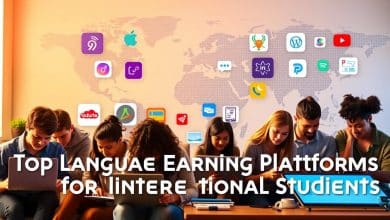Best Free Resources to Improve Your Academic Writing
Students today navigate a maze of challenges when crafting essays, research papers, and dissertations. From structuring arguments to polishing grammar, the demands can overwhelm even dedicated learners. Free digital tools now bridge this gap, offering professional guidance without costly subscriptions or tutors.
Platforms like Purdue OWL demonstrate how institutions support learners. Their materials span rhetorical strategies, document formatting, and real-world assignment examples. Such comprehensive assistance empowers students to tackle discipline-specific requirements across STEM, humanities, and social sciences.
These open-access hubs transform education by making expertise available 24/7. A first-generation college student can access the same style guides as peers from privileged backgrounds. Struggling writers revisit tutorials on thesis development or citation rules until concepts click.
The shift toward free online support reshapes how learners build critical skills. Interactive exercises, downloadable templates, and peer-reviewed examples create self-paced learning environments. This evolution ensures quality instruction isn’t locked behind paywalls—it’s just a click away.
Overview of Free Academic Writing Tools
Navigating formatting rules and stylistic demands can derail even focused learners. Free platforms simplify this process by offering structured guidance for crafting polished work. These tools address everything from citation mechanics to inclusive design principles.
Curated Guides from Purdue OWL®
Purdue’s Online Writing Lab delivers instant solutions for common challenges. Their style guides break down APA, MLA, and Chicago formats into digestible steps. Interactive exercises let users practice concepts like:
- Integrating sources without plagiarism
- Formatting title pages and reference lists
- Applying discipline-specific terminology
“Accessible materials ensure every student can engage with complex concepts on equal footing.”
Walden University Accessibility and Resource Support
This institution prioritizes universal access through specialized services. Users can request format adjustments or troubleshoot assistive technology conflicts via disability@mail.waldenu.edu. Their resource table highlights key features:
| Feature | Purdue OWL | Walden University |
|---|---|---|
| Style Guides | MLA/APA/Chicago | APA Focus |
| Practice Modules | 60+ Interactive Exercises | Customizable Templates |
| Support Response | N/A | 48-Hour Guarantee |
Both platforms demonstrate how institutions can empower learners through open-access expertise. Their collaborative models set benchmarks for educational equity in digital spaces.
Diverse Citation & Style Guides
Mastering documentation standards remains a hurdle for many learners. Three major formats dominate modern scholarship, each with evolving rules. Updated guides and digital tools now streamline this process, letting users focus on content quality over formatting stress.
APA, MLA, and Chicago Reference Sheets
Purdue OWL’s cheat sheets simplify complex guidelines. The 7th Edition APA guide clarifies digital source citations, while MLA’s 9th update addresses streaming media entries. Chicago 17th Edition templates help history students handle archival materials. Key features include:
- Discipline-specific examples (psychology vs. literature)
- Visual formatting templates for bibliographies
- Annotations for tricky sources like podcasts or patents
| Style | Common Disciplines | Source Types Covered |
|---|---|---|
| APA | Social Sciences | Journals, Datasets |
| MLA | Humanities | Poetry, Films |
| Chicago | History | Archives, Interviews |
Zotero and Citation Management Tools
This free software cuts citation time by 70% for many users. Zotero automatically grabs metadata from websites and PDFs, generating perfect references. Its browser extension works with 15,000+ academic sites. Benefits include:
- Cloud sync across phones, tablets, and laptops
- Team collaboration features for group projects
- One-click bibliography exports
“Proper attribution isn’t just about rules—it’s about honoring intellectual labor.”
ZoteroBib serves quick needs, formatting single citations in seconds. Both tools teach source evaluation through practice, building skills that outlast any assignment. Students report higher confidence when submitting papers, knowing their references meet current standards.
Key Academic Writing Resources
Crafting polished papers requires more than just subject knowledge—it demands strategic use of specialized tools. Learners need targeted approaches for different project types, whether analyzing lab data or drafting personal narratives.
Resources for Writing Assignments and Research
Platforms like Labwrite offer templates for scientific reports, while IMRaD checklists ensure proper methodology documentation. The Career Development Center provides resume-building tools and speech evaluation rubrics. These materials help students:
- Structure literature reviews with discipline-specific frameworks
- Format grant proposals using institutional guidelines
- Develop professional emails that maintain scholarly tone
Thesis Statements, Transitions, and Proofreading Strategies
Strong claims form the backbone of persuasive arguments. Effective transitions—like “conversely” or “building upon this”—create logical flow between evidence points. Proofreading goes beyond spell-check through techniques such as:
- Reading drafts aloud to catch awkward phrasing
- Using backward editing to spot grammatical errors
- Applying peer review checklists for objective feedback
Workshops, Tutoring, and Additional Support
Many institutions provide layered assistance through multiple channels. This table shows common options:
| Service | Response Time | Specialization |
|---|---|---|
| Live Workshops | Immediate | Group Learning |
| One-on-One Tutoring | 24-48 Hours | Personalized Feedback |
| Online Modules | Self-Paced | Technical Skills |
“Quality feedback transforms drafts from good to publication-ready.”
Conclusion
Digital innovations have revolutionized how learners refine their communication abilities. Free platforms erase financial hurdles while offering professional-grade support. Students can polish essential writing techniques through video tutorials or downloadable templates, progressing from basic structure to complex analysis at their own rhythm.
NC State’s skill-building materials demonstrate this shift. Their handouts address discipline-specific challenges, while campus hubs provide in-person guidance. Updated content keeps pace with evolving standards, ensuring learners access current methodologies across formats.
This collaborative approach bridges gaps between traditional instruction and tech-driven solutions. Peer networks and expert-reviewed exercises foster communities where feedback fuels growth. Such ecosystems empower students to own their development journey—no subscriptions required.
With 24/7 access to vetted tools, geographical barriers dissolve. Learners everywhere gain equal opportunities to master critical skills, transforming stress into confidence one draft at a time.
FAQ
Where can students find trusted style guides for assignments?
What tools help organize references for research projects?
How can learners improve thesis statements in drafts?
Are there free proofreading strategies for essays?
Where to access workshops for structuring arguments?
Published on: 14 de August de 2025







